
views
See your doctor before getting pregnant if possible.

If you’re not pregnant yet, get a head start by taking care of yourself now. Make an appointment with your doctor and tell them you’re trying to conceive. They’ll give you a checkup, ask about your health history, and give you advice about how to have the smoothest possible pregnancy. They may also recommend starting a prenatal supplement containing folic acid, which is essential for a healthy pregnancy. Don’t forget to discuss things like: How to manage any health conditions you may have Whether it’s safe to take your current medications and supplements during pregnancy If there are any lifestyle changes you should make to have a healthier pregnancy Which vaccines you should get before you get pregnant How to manage your physical fitness before and during pregnancy What to do if you have a previous history of miscarriages or complicated pregnancies
Start prenatal appointments as soon as you find out you're pregnant.
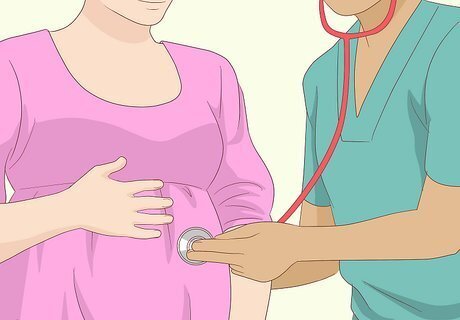
Your doctor will do regular checkups to make sure things are going well. As soon as you think you might be pregnant, see your doctor. Once they confirm the pregnancy, they’ll develop a care plan with you. This typically includes regular checkups every few weeks (or more often, if you’re over 35 or your pregnancy is considered high-risk). They’ll also schedule tests such as ultrasounds and lab work to monitor your health and the baby’s. At most prenatal visits, you can expect the doctor to listen for your baby’s heartbeat and measure your belly to check how well the baby is growing. They’ll also take a sample of your urine at each visit, since urine testing can help them spot potential health issues right away. You’ll likely see your doctor every 4 weeks during the first trimester, with checkups becoming more frequent as you get further along. Regular prenatal checkups allow your doctor to catch any possible problems and treat them right away—plus, they’re a great opportunity for you to ask questions or get reassurance if you’re worrying about anything.
Get any medical tests recommended by your doctor.
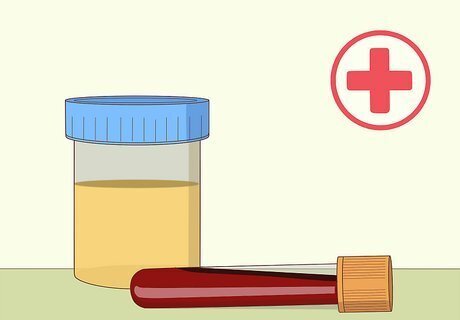
Depending on your health history, your doctor might recommend extra tests. Some medical tests are a routine part of prenatal care, such as regular testing for protein and sugar in your urine. Your doctor will also probably order blood tests to check for things like anemia (low iron in your blood), certain diseases (such as hepatitis C and rubella), and genetic conditions that could put your baby at risk. They might also recommend tests such as: An oral glucose tolerance test, to check for gestational diabetes. Your OB/GYN will test your blood about an hour after having you swallow a very sugary drink. This test is usually done some time in the 24th-28th weeks of pregnancy. Blood tests to check for certain genetic conditions in you or your baby. Your doctor might recommend this if you’re over a certain age, part of an at-risk group, or have a family history of genetic diseases. More detailed or more frequent ultrasounds to look for any potential issues with your baby’s development.
Eat a healthy, balanced diet.

Eating the right foods increases your chances of having a smooth, healthy pregnancy. If you’re not sure what to eat—or how much—your doctor can help you make healthy choices. In general, stick to a balanced diet rich in vegetables and fruits, whole grains, and healthy proteins (such as poultry breast or low-fat dairy products). Drink plenty of water so that you don’t get dehydrated, which can happen more easily while you’re pregnant. You’ll also need to avoid or cut back on certain foods that you might normally eat, such as: Raw fish or fish high in mercury (such as albacore tuna) Undercooked meats and deli meats, which may contain harmful bacteria Unpasteurized cheeses Drinks that are high in caffeine—try to stick to no more than 200 mg per day, or the amount of caffeine in a 12 fl oz (350 mL) cup of coffee
Take your prenatal vitamins.
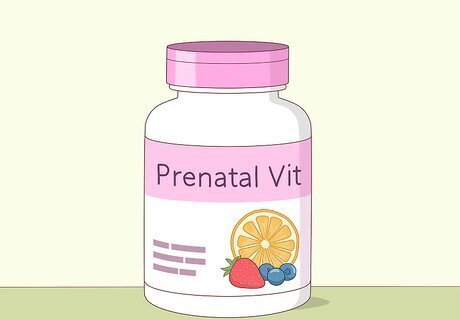
Your doctor may prescribe a prenatal vitamin or recommend one you can get over-the-counter. Prenatal vitamins help ensure that you get all the extra nutrients that you and your baby need. Among other important vitamins and minerals, prenatals contain folic acid, a type of B vitamin that is crucial for your baby’s healthy development. Ask your doctor to check your blood for any vitamin deficiencies, such as iron, vitamin D, or vitamin B12. If they find deficiencies, they might recommend taking extra supplements or modifying your diet. You can also get more of the nutrients you need by eating a healthy diet. For example, get additional folic acid by eating plenty of leafy greens, peas and beans, and fortified breakfast cereals.
Get plenty of exercise.

Staying in good physical shape will make your pregnancy and childbirth a lot easier. Ask your doctor about which forms of exercise are safe for you. Typically, it’s okay to continue exercises such as walking, stationary biking, swimming, and yoga while you are pregnant, as long as you stay hydrated and avoid exhausting yourself or getting too overheated. Aim to get about 150 minutes of moderate-intensity exercise each week, or 30 minutes a day, 5 days a week. Do not be sedentary for too long. Get up every half hour and do a couple of heel raises, squats, or upper body salsa. You can walk briskly for thirty minutes daily. You can do dance, pilates, or yoga. Avoid exercises or poses that might put you at risk of falling (such as certain yoga poses that require good balance) or that require you to lie flat on your back for long periods of time. If you do yoga or Pilates, look into special prenatal programs that stick to pregnancy-safe poses and exercises. Stay away from high-risk or high-impact activities such as contact sports, skiing, off-road biking, gymnastics, and skydiving. Some medical conditions or pregnancy complications can impact what kinds of exercise you can do safely. For example, your doctor might recommend avoiding exercise if you have placenta previa, pre-eclampsia, severe anemia, or a multiple pregnancy of triplets or more.
Take special care of your teeth to avoid gum infections.
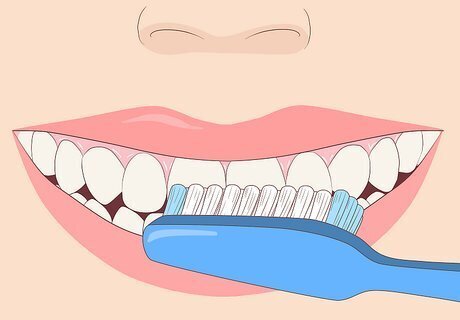
Hormone changes during pregnancy increase your risk of gum disease. Gum infections can be a health risk for both you and your baby. Brush twice a day and floss at least once daily to keep your mouth healthy. See a dentist at some point during your pregnancy for a cleaning and checkup, and talk to them about treating any cavities, gum disease, or other issues. If you have morning sickness, rinse your mouth after throwing up with 1 tsp (5 g) of baking soda dissolved in a glass of water. The baking soda neutralizes stomach acid that can damage your teeth.
Avoid tobacco, alcohol, and drugs that could harm your baby.

Some substances can harm your baby or make you less healthy during pregnancy. You probably already know that it’s a bad idea to smoke or drink alcohol while you’re pregnant. If you’re struggling to quit smoking, drinking, or using other kinds of recreational drugs, talk to your doctor—they can help you! You might hear conflicting advice about whether it’s safe to drink a small amount of alcohol while you’re pregnant. But while some studies suggest that a glass of wine once in a while is unlikely to do much harm, there’s no known safe drinking limit during pregnancy. When in doubt, ask your doctor—they can help you understand the possible risks.
Ask your doctor which medications are safe.
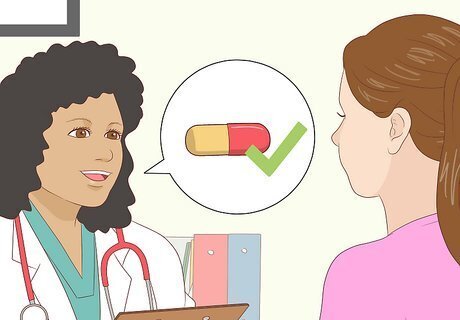
You might need alternative treatments if you’re taking certain prescriptions. If you’re pregnant or planning to become pregnant, give your doctor a full list of any medications you’re taking. They can help you figure out which ones are safe and which ones you need to stop or change. For instance, certain acne medications, antibiotics, blood pressure medications, and antidepressant or anti-anxiety medications may be risky during pregnancy. In some cases, you’ll need to weigh the potential risks and benefits of continuing a certain medication during your pregnancy. For instance, if you’re taking SSRI antidepressants, don’t quit without consulting your doctor first. The benefits to you and your baby likely outweigh the risks of continuing the medication. Not all over-the-counter medicines are safe during pregnancy, so ask your doctor what you can take if you get a sniffle or a headache. For instance, it’s generally safe to take acetaminophen (Tylenol), but it’s better to avoid NSAID pain relievers like ibuprofen (Motrin, Advil) or naproxen (Aleve).
Use relaxation techniques to help manage your stress levels.

There’s no way around it—pregnancy is stressful! No matter how excited you are about meeting your new little one, you also have a million new things to worry about. While you can’t eliminate stress from your life completely, it’s important for your own and your baby’s health to keep it under control as much as possible. If you’re feeling overwhelmed, try stress-busting activities such as meditation or yoga, journaling, working on hobbies you enjoy, spending time outdoors, or chatting with a friend or loved one. If you have too many responsibilities on your plate, don’t be afraid to ask for help. For instance, if you have a partner, ask them if they can take on some of the chores you’d normally do around the home. If you’re struggling with depression, anxiety, or severe stress, talk to your doctor. They might recommend seeing a therapist or even prescribe medications that can help.
Develop a birth plan with your OB/GYN or midwife.

Having a plan makes the idea of giving birth feel less overwhelming. Childbirth is unpredictable, and your baby will almost certainly surprise you. However, you can still take control over some aspects of the experience by planning ahead. Sit down with your doctor or midwife and talk about your options—and what to do if things don’t go as planned. For example, you might want to decide ahead of time: Whether you’ll give birth in a hospital, a birth center, or your own home Who will be present during the delivery (e.g., your partner, another family member, a friend, or a doula) Whether you want to get an epidural or use other pain management techniques during the delivery What types of birthing positions or activities you’d like to try (e.g., walking, using a birthing ball, or squatting)
Call your doctor when in doubt.
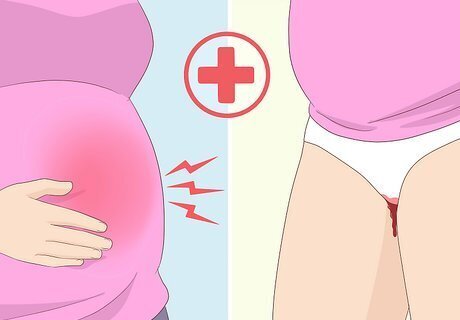
Don’t wait for your next prenatal checkup if you have concerns now. If you have a question or if you’re noticing symptoms that worry you, pick up the phone and call your OB/GYN’s office. They can give you advice over the phone, schedule an appointment for a checkup, or advise you to head to the emergency room for immediate care. Call your doctor immediately or seek emergency care if you: Have severe abdominal pain or cramping Notice unusual vaginal bleeding Are suddenly peeing a lot less or have pain when going to the bathroom Have a fever over 101 °F (38 °C) Have a severe headache that lasts more than 2-3 hours or changes in your vision (such as blurring or double vision) Experience sudden and severe swelling in your hands, feet, or face Notice fewer than 10 kicks or movements from your baby in 2 hours during a kick count (starting after 28 weeks of pregnancy) Have thoughts about harming yourself or your baby




















Comments
0 comment